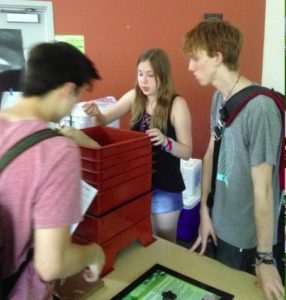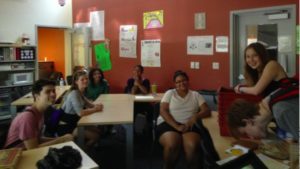2014 Sacramento, California, USA

In researching ways to improve their local watershed, Molly Crofoot and Loki Spera became very interested in the concept of vermicomposting, or worm composting. Different than traditional composting, worm composting is a process that uses red earthworms to consume organic waste, producing castings, soil conditioner, and a topsoil additive. While there are other ways to break down things such as food and yard waste, vermicomposting is a lot easier for people who live/ work in a place with very little outdoor room. Their project proposal was to build a worm bin at their school, The MET Sacramento High School, and educate students on its use. Specifically, they would train members of the Garden Club, who would take over general maintenance of the bin, and use the soil created to add to the garden beds.
Vermicomposting has many benefits for the environment. The process creates a nutrient rich soil, which helps grow a healthy, sustainable garden without the need for chemical fertilizers. It also builds healthy soil structure that reduces watering needs and absorbs runoff, protecting streams from erosion and pollution. Finally, it makes use of food waste that would otherwise enter landfills. Project funds from Nutrien helped Crofoot and Spera purchase a durable, multi-level bin and host a lunch workshop for students on vermicomposting, its benefits, and how to maintain the bin.